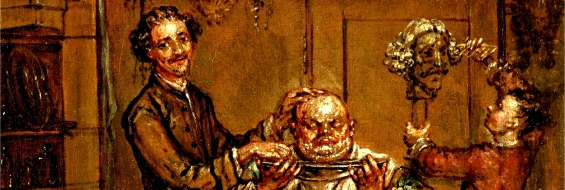
The barbershop was unmarked, no pole, no sign out front. Just a door inauspiciously squeezed in between the Cartier and Stefano Ricci stores. I was in search of a straight razor shave, that (second-) most primal masculine pleasure, and I wasn’t exactly hopeful. Earlier, when I had inquired after one, I was directed to a pharmacy; something lost in translation. Shifting tacks, I asked about a barbershop. And there was one—right down the street, on the via Tornabuoni.
It was ten and they would open in an hour but I decided to walk over anyway. Noticing it next to Cartier, I imagined that language had again betrayed me. On Florence's fanciest retail street, could a barbershop be anything more than a glorified salon—the kind of place with €30 pomades made from Tahitian vanilla extract—a barbershop in name only? There of course was only a single way to find out.
The shop was open early, a fortuitous twist to the usual Italian timetable. I opened the door and was greeted with a standard "Giorno" by two men, presumably the barbers, one of whom was chatting with a distinguished looking older gentleman, dark suit and wild white locks flowing out of his head. To my eyes he was a perfect embodiment of what some call sprezzatura, that studied nonchalance upon which Italians seem to have a monopoly. Maybe it was completely unstudied. Whatever it was, this old boy had it.
Standing in the door I tried to remember the Italian word for shave. I failed. So I did the next best thing. "Inglese?" The response was not reassuring. Prevarication from the barber not currently engaged with the older man. "Ehhh, un po"—"A bit." I could work with it. Squirming, I asked "Erm, shave?" and launched into a foolish pantomime. Hand gripping an imaginary straight razor, I made a shaving motion, stripping away the five-days’ growth for far too long. Eventually, I got the point across as the barber, a middle-aged balding man dressed in blue-striped shirtsleeves, motioned to the empty chair and said "Sì." I took my seat just as the other customer sat down in his, apparently for a trimming of his shock-white hair.
Any doubts I had were soon extinguished, first by a scalding hot towel, left on until the temperature was more bathtub than hot tub. Then some soap, identified solely by its sandalwood smell. After that the cream, more sandalwood with maybe a bit of lavender. Nothing terribly remarkable about that; pleasant enough. But the lather! For twenty minutes, the mute Italian barber worked my face with a vigor unseen in Florence since the Guelph-Ghibelline feud of the thirteenth century. His manner was more Leonardo than Botticelli, wielding the badger brush like a club rather than a paintbrush. It made sense; the point of using a brush to face-lather is to lift the coarse hairs off the face, making them more amenable to the coming blade.
As the blade emerged I had the overwhelming feeling that I was in the hands of a master, the kind of old-world artisan found only on Florentine side streets. After the virtuosic brush performance the only possible outcome was a perfectly smooth shave, one lacking the nicks and cuts, the stings and pricks associated with the everyday act.
Towards the end I became aware. I had forgotten the most salient point about a straight razor shave. Regardless of the skill of the practitioner, regardless of the quality of the lather, the blade will cut you. It is a single blade against a rough, uneven surface of skin. And it cut me. A lot. To the Italian’s credit I didn’t notice until the shave was nearly done. Forty five minutes later, without a single word exchanged between my executioner and myself, all my facial hair was gone. But so was a good bit of my skin. Perhaps at first my face was numbed by the force of the lather. But towards the end, right before the inevitable styptic pen, I had a sinking feeling. The lather had set the bar too high. The shave could never live up. It’s still a blade and it will still cut you. When the pen appeared my greatest fears were borne out. The brutal stinging sensation was the confirmation. The great pleasure of a shave comes from its initial stages—that’s what I always remember because that’s what is most pleasant.
And yet if the cuts and sting are inevitable, why do I go back? Why do I seek out straight razor shaves in Florence and at home? Because despite the bloodbath, I always come out cleansed. Baptism by blade. The shave connects me to the past, providing for my direct communion with centuries of men. How many activities remain essentially unchanged over hundreds of years? When I got my shave in Florence, I was practically transported to the late eighteenth century, on my grand tour, reading Winckelmann, seeing the Venus of Urbino at the Uffizi. Those young men’s faces were cut just like mine. Theirs probably hurt more.
As I walked out of the shop, having paid a mere €10 for the pleasure, I reflected upon what had just transpired. Yes, I had gotten a shave, and yes my face burned with the fires of hell. But I had also sated my nostalgic urges. I had engaged with the past, with tradition, in my present. A few cuts were a small price to pay.
